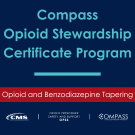
Opioid and benzodiazepine tapering: Best practices
Opioids and Benzodiazepine Tapering: Best Practices, provides a practical guide to safely and effectively tapering patients off opioids and benzodiazepines. This session will focus on patient selection for tapering, including identifying those at high risk for serious adverse outcomes and those most likely to benefit from this process. Participants will learn effective strategies for introducing the concept of tapering to patients, ensuring clear communication and patient buy-in. The lecture will then delve into best practices for tapering both opioids and benzodiazepines, addressing the specific challenges and considerations for each drug class. Finally, this session will discuss the transition from traditional chronic opioid therapy to buprenorphine, offering guidance on this increasingly common practice.
Target Audience
Physicians
Advanced Practice Clinicians
Learning Objectives
- Identify patient selection for tapering, including those at-risk for serious adverse outcomes and/or who would benefit from tapering
- Learn how to introduce tapering to patients in an effective manner
- Discuss best practices around tapering opioids
- Discuss best practices around tapering benzodiazepines
- Discuss transitions from traditional chronic opioid therapy to buprenorphine
Rachael Duncan, PharmD BCPS BCCCP
Rachael is a pharmacist and consultant for Stader Opioid Consultants based in Colorado. She has spent the past eight years focused on policy, advocacy, and educational work surrounding harm reduction and substance use disorder treatment at both the state and national level. She serves on the board of directors for the nonprofit The Naloxone Project and is Co-Chair of the MOMs (Maternal Overdose Matters) Initiative, which helps birthing hospitals distribute naloxone directly to at-risk perinatal patients and families. She is also program director for MOMs+, which helps birthing hospitals provide equitable access to treatment and recovery for perinatal patients affected by substance use disorder. Her clinical practice is in hospital-based pharmacy.
Continuing Medical Education (CME)
Accreditation: This activity has been planned and implemented in accordance with the accreditation requirements and policies of the Iowa Medical Society (IMS). Compass Healthcare Collaborative is accredited by the IMS to provide continuing medical education for physicians.
Designation: Compass designates this live activity for a maximum of 1.0 AMA PRA Category 1 Credit(s)™ Physicians should claim only the credit commensurate with the extent of their participation in the activity.
Commercial Support: This activity was developed without support from any ineligible company. *The ACCME defines ineligible companies as those whose primary business is producing, marketing, selling, re-selling, or distributing healthcare products used by or on patients. Note: The ACCME does not consider providers of clinical service directly to patients to be commercial interests unless the provider of clinical services is owned, or controlled by, and ACCME defined ineligible company.
Disclosure: Compass adheres to the Standards for Integrity and Independence in Accredited Continuing Education. The content of this activity is not related to products or the business lines of an ACCME-defined ineligible company. None of the planners or moderators for this educational activity have relevant financial relationships to disclose with ineligible companies whose primary business is producing, marketing, selling, re-selling, or distributing products used by or on patients.
Note: AMA PRA Category 1 Credits™ are accepted for nursing and other healthcare discipline license renewal purposes, provided the topic is relevant to the applicant’s field or discipline. After participating, you will receive a Certificate of Attendance detailing the number of AMA PRA Category 1 Credits™ you can claim. This certificate is provided for self-reporting requirements and must be submitted to your state board for license renewal.
Merit-based Incentive Payment System (MIPS) Credit Designation: Improvement Activity (IA): This activity qualifies for MIPS credit as an Improvement Activity. Participants who successfully completed the activity are eligible for full credit for the Improvement Activities category of the MIPS program. Note: Each provider must attest to your participation and practice changes on the CMS QPP website, but you can reference the MIPS verbiage noted below.
Activity Type: Patient Safety and Practice Assessment (IA_PSPA_CME):
Activity ID: IA_PSPA_28: Completion of an Accredited Safety or Quality Improvement Program.
- Documentation includes:
- Meaningful clinician participation in a project focused on improving pain management.
- Documentation of data collection and analysis regarding prescribing patterns.
- Implementation of interventions to improve quality or safety.
- Measurement of the impact of the interventions.

Available Credit
- 1.00 AMA PRA Category 1 Credit™

 Facebook
Facebook X
X LinkedIn
LinkedIn Forward
Forward